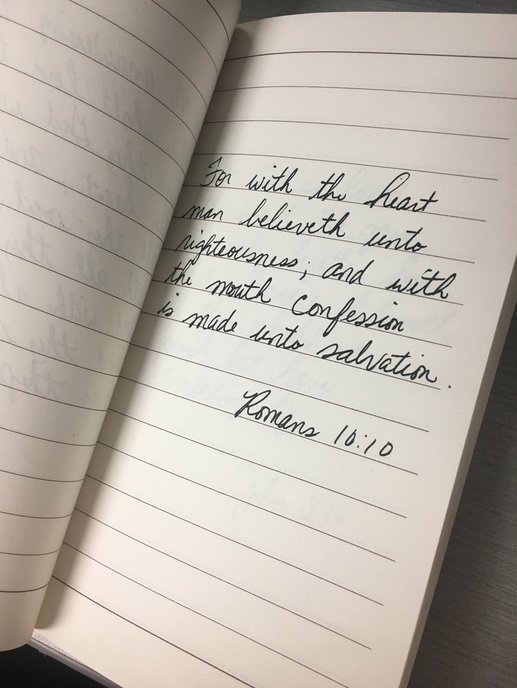|
A few months ago I started a scripture notebook. It's just a little book I carry around in my purse and in which I occasionally write verses when they come to mind. There are no rules to it, except for I try not to write the same verse in the book twice. This forces me to flip back through to check before I write a new verse, which refreshes me as I skim and remember all the scriptures I have written previously. My notebook contains the type of verses we sometimes call "memory verses". They stand on their own, without explanation, additional context, or historical reference. I like to call them "nuggets", like little treasures you can easily carry.
"Let your light so shine before men..."
"A merry heart doeth good...." "For God so loved the world..." "Greater love hath no man than this..." "In the beginning God created..." "What time I am afraid..." "In all thy ways acknowledge Him..."
Can you finish all those verses? My guess is, yes! These are wonderful, important truths to cherish. And I encourage you to practice memorization of verses like these. That's one of my goals- to start committing these to memory. While these "nuggets" of scripture are important, we most also appreciate the importance of the Word as a whole. In the second book of Timothy, chapter 3, verse 16, Paul says, "All scripture is given by inspiration of God, and is profitable for doctrine, for reproof, for correction, for instruction in righteousness:" We may not go around quoting genealogies or Mosaic law, but each line of scripture is included in the Bible for a specific purpose.
Learning how to handle and correctly apply the Word is the subject of 2 Timothy 2:15: "Study to shew thyself approved unto God, a workman that needeth not to be ashamed, rightly dividing the word of truth." We have to learn to sort and apply the nuggets and the genealogies, the parables and the historical events- to appreciate and, use for our benefit, the entirety of the Word He has provided. When we rightly divide the Word we understand that scripture will never contradict itself. Some ideas may appear contradictory, but a proper study, use of appropriate resources, and most importantly discernment from the Holy Spirit, can and will negate any of those doubts. Rightly dividing the Word means we are careful not to piece together scripture to suit our own agenda, and we can also recognize when that is being done by others. It's an outrageous example, but if someone quoted from Matthew where it says Judas "went and hanged himself" (27:5) and merged that with our Savior's exhortation "go, and do thou likewise" (Luke 10:37, speaking of showing mercy like the Good Samaritan), that would be an egregious and profane misuse of scripture! We are likely to encounter a much more subtle example, but if we know how to rightly divide the Word, by knowing the Word, we won't get tripped up by these tactics.
The Bible refers to the Word of God as a "sword": "And take the helmet of salvation, and the sword of the Spirit, which is the word of God." Ephesians 6:17 (Also, see Hebrews 4:12)
A sword is a powerful weapon, to be handled with care. Our study of God's word is swordsmanship training, and the application of the Word in our lives, in a manner of speaking, is swordplay. While I may never be a master swordsman, I pray that God will help me grow in my ability to rightly divide the Word, and that He will do the same for you.
0 Comments
Leave a Reply. |
About the BlogThank you for visiting my blog. I share devotional articles and musings about life, parenting, and the writing journey, as well as important news about my books. I hope you find something of interest here! Click below to sign up for my email newsletter, which includes links to my latest blog posts. Thank you!
Categories
All
Archives
August 2023
|







 RSS Feed
RSS Feed